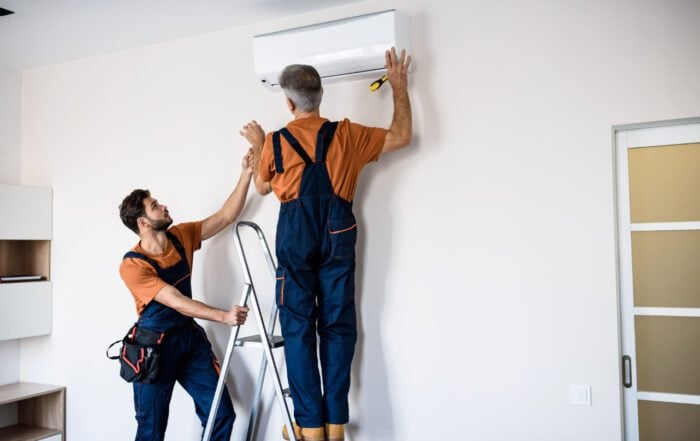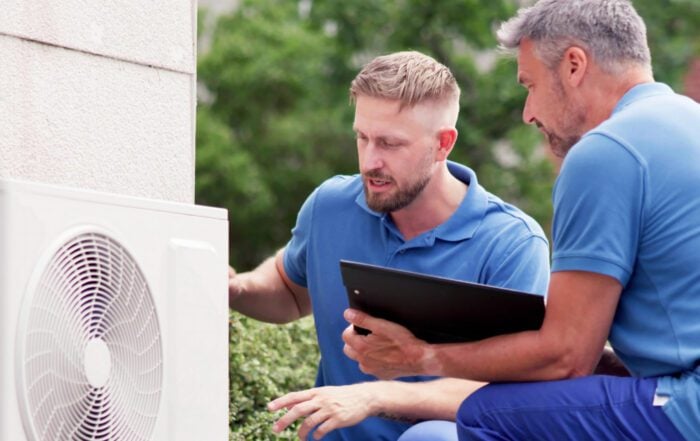You bought a new home and have come to realize how many repairs there are to complete. The stove, of course had to go since it was an outdated, electric range. A gas replacement seems like the solution. You know it will save you in the long run. But after you started inspecting the property a little more carefully, you noticed quite a few other issues that you should address. There’s old insulation, some rattling from the HVAC unit, not enough electrical outlets available, and quite a few other problems.
Some of the updates you know you can do yourself, such as fixing the leaky faucet in the downstairs bathroom or repainting the living room and kitchen; but some of the issues you’re not so sure about. You’ve seen some DIY videos on the internet, but they look like you could run into some complications. You’ve been contemplating just changing the stove’s power supply over yourself to save money. The problem is, you’re just not sure how safe that would be.
So how do you know which projects are safe to complete yourself?
There are plenty of projects you can DIY around your home, but there are some major ones that professionals should handle.
Contractors go through years of training. They spend that time learning how to properly handle electrical lines, gas lines, water lines, etc. — things of which most homeowners don’t have an advanced knowledge.
A rule of thumb would be: if you don’t have a firm understanding of the task at hand, don’t do it. However, in a world were How-To videos are easily accessible on the internet, it’s easy to quickly gain an understanding of the project. But just because there is an instructional video available doesn’t mean you should do it.
Here are some projects you should always have a professional complete:
1) THE SWITCHING THE STOVE FROM ELECTRIC TO GAS DIY PROJECT
This may sound like a simple swap out, but it’s not.
There are two sets of codes with which this installation must comply, so there are actually two professionals you need to work with to complete the project: an electrician and a plumber.
There are a few problems which could occur relating to the gas line:
- When not properly connected, the gas line can form leaks which cause dangerous emissions. When these emissions are high enough, they can be fatal.
- Natural gas is also highly combustible, which is why it is so often used for stoves, water heaters, and other appliances — a small amount of gas can produce a significant amount of heat. However, when introduced to too much heat, it can develop into a fire and spread quickly through a home or even result in an explosion.
- Without proper installation or ventilation, gas will not completely burn up and develop into a carbon monoxide byproduct.
For electrical:
- When not completed correctly, incorrect electrical work can get you into a lot of trouble. Like a gas leak, shoddy wiring can result in a fire.
- Of course, when you’re ready to sell your home, an inspector will check the electrical wiring. If it is not up to code, you’ll end up having to pay a fine as well as hire someone to fix it.
2) THE ASBESTOS REMOVAL DIY PROJECT
A project such as replacing insulation is not a difficult task, but when you have an older home, there’s a strong chance you could be dealing with toxic contaminants like asbestos.
Asbestos is a bundle of minerals that can be separated into fibers to produce fire-, heat-, and chemical-resistant material used in commercial and industrial applications. It was banned in the late 1980’s but any material containing it that was installed or put into use before the ban could still be in use today if it was never replaced.
Asbestos is also a known carcinogen; insulation riddled with it poses health risks since the fibers can break off and become airborne. When they’re inhaled, they lodge themselves in the chest and lungs, causing cancerous diseases later on.
Rather than try to do it yourself, it’s best to hire a professional to remove the old, contaminated insulation or other asbestos products. They know how to remove it without introducing hazards to your home and family.
3) THE REPAIRING YOUR HVAC SYSTEM DIY PROJECT
Cheaper may sound better, but in this case, it’s not.
Trying to repair your HVAC on your own can be more damaging than hiring a professional.
Unlike asbestos, the freon found in air conditioning units and refrigerators is not a carcinogen; however, it does still contain health hazards if it leaks. It causes:
- Dizziness
- Asphyxia
- Respiratory problems
- Cardiac arrhythmia
The more severe side effects will occur at the time of exposure and can be expelled from the body through deep inhalation of clean air; but you should not stay near the leak until it is fixed – by a professional.
You can also void the manufacturer’s warranty.
Manufacturers don’t want unlicensed personnel working on or altering their equipment. Someone not properly trained can damage the equipment beyond repair – something manufacturers won’t cover unless the damage is due to faulty equipment.
4) THE REPLACING A HOT WATER TANK DIY PROJECT
New water tanks require permits, code checks, and safety regulations — things most DIY-ers cannot handle themselves.
Just like with a gas stove, carbon monoxide emissions are possible. Carbon monoxide is odorless and tasteless. You would not be able to see, smell, or taste it in the air if you did have a leak.
If a water heater is not properly installed, it leaks the carbon monoxide byproduct into the home, putting you and your family at risk. Lines need to be sealed correctly, and the unit must be properly vented as not to cause any buildup of fumes. A CO detector will alert you to any high levels of carbon monoxide in your home, but it’s always best to take preventative steps.
You’re also working with a relatively high voltage of electricity along with gas lines. A misstep could result in an explosive leak.
This type of replacement requires a professional – it’s not an option.
5) ANY MAJOR ELECTRICAL REPAIRS
Electrical upgrades and modifications should always be completed by a licensed professional. Working with a main power source such as your home’s electrical system can be extremely dangerous.
When you attempt to work with electrical components without proper training, you’re putting yourself and your family at risk.
Without an adequate level of care, you’re likely to electrocute yourself or even cause a fire. Electricians undergo years of training to receive their license as well as participate in yearly courses to keep their knowledge-base up-to-date.
As we mentioned before, you can also end up paying more out of pocket than if you just hire a professional in the first place.
If any problems arise due to wiring that’s not up to code, you will be fined as well as have to pay for any damages and to hire a professional to fix the issue. And when your home is eventually inspected during sale or if you put on an addition, that will also result in fees.
It’s cheaper and safer to have a professional electrician take care of these repairs from the beginning.
There are plenty of do-it-yourself projects you can do around your own home, and quite a few of them will help keep your budget low; but many of them will end up costing you much more than you originally planned in the end. It is better to hire a professional such as Stack Heating, Cooling, Plumbing & Electric from the start rather than try it yourself and then have them rescue you.
Have Any Questions?
If this is an emergency please call 440-937-9134.
Otherwise, please feel free to call us or submit this form to schedule an appointment for service or request an estimate. We will contact you shortly!



